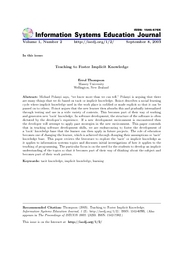Volume 1
Abstract: Michael Polanyi says, "we know more than we can tell." Polanyi is arguing that there are many things that we do based on tacit or implicit knowledge. Boisot describes a social learning cycle where implicit knowledge used in the work place is codified or made explicit so that it can be passed on to others. Boisot argues that the new learner then absorbs this and gradually internalized through testing and use in a wide variety of contexts. This becomes part of their way of working and generates new 'tacit' knowledge. In software development, the structure of the software is often dictated by the developer’s experience. If a new development environment is encountered then the developer will attempt to apply past strategies in the new environment. This paper contends that in teaching software development skills, we are endeavouring to foster the development of a 'tacit’ knowledge base that the learner can then apply in future projects. The role of education becomes one of changing the learner, which is achieved through changing their assumptions or 'tacit’ knowledge base. This paper reviews the literature to explore the 'tacit’ or implicit knowledge as it applies to information systems topics and discusses initial investigations of how it applies to the teaching of programming. The particular focus is on the need for the students to develop an implicit understanding of the topics so that it becomes part of their way of thinking about the subject and becomes part of their work pattern. Keywords: tacit knowledge, implicit knowledge, learning Download this issue: ISEDJ.1(2).Thompson.pdf (Adobe PDF, 10 pages, 533 K bytes) Preview the contents: Thompson.txt (ASCII txt, 23 K bytes) Recommended Citation: Thompson (2003). Teaching to Foster Implicit Knowledge. Information Systems Education Journal, 1 (2). http://isedj.org/1/2/. ISSN: 1545-679X. (A preliminary version appears in The Proceedings of ISECON 2003: §3233. ISSN: 1542-7382.) |
